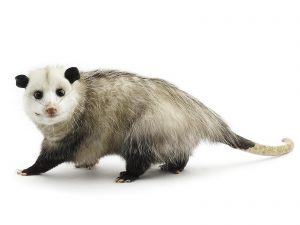Opossums are adaptable and seek existing shelter, even if it means invading your home. They usually occupy abandoned burrows and dens since they don’t build their own, which means they may find their way into your garage, porch, attic, or crawlspace. It’s important to know what opossums look like, what is the diet of an opossum, what attracts opossums to your property, what is the behavior of an opossum, and what are the signs of an opossum in your home.
Request Opossum Removal Services ➔

What Do Opossums Look Like?
Like raccoons, opossums have adapted remarkably to humans. They are commonly found in urban and suburban areas. When considering what an opossum looks like, it’s important to note they can often be mistaken for raccoons due to some similarities in their features. However, their coats are distinctly unique.
Virginia opossums, for example, are generally about the size of a domestic cat, though their size varies depending on location and food availability. Their fur is dull gray, with white around their long snouts and pink noses and feet. They have long, hairless, prehensile tails that they can use to grab branches and carry small objects.
What Do Opossums Eat, and What Would Attract Them to Your Home?
Opossums are opportunistic omnivores — opossums eat anything that looks like food in and around your home. An opossum’s diet varies widely depending on what’s available during that season. Still, opossums will eat small rodents, insects, pet food, roadkill, eggs, fruit, and any discarded human foods. Opossums also eat ticks during grooming, which helps control the spread of Lyme disease.
They’ll take advantage of any exposed food sources like garbage cans because they contain food remains that require no effort to hunt. By keeping trash out of sight and reach until the garbage is collected, you’ll reduce the chance of them scavenging it. Pet food should also be stored out of reach, especially if you have a dog bowl on your porch.
Search your grounds and particularly your garden for snake holes, bird nests, hollow logs, and tree roots that may attract opossums. Then, call a professional opossum removal company to inspect your entire property in case you have an existing pest infestation that’s drawing them to your home.
Opossum Behavior
Opossums are known for their tendency to play dead when threatened. The opossum will enter a self-induced coma and lie on the ground with an open mouth to convince predators it is already dead — once the predator leaves, it wakes up. When frightened, opossums can release a putrid green fluid to repel predators.
Breeding season for Virginia opossums starts between December and October, and most litters are born between February and June, so you can expect increased activity around these times. They may be drawn by the warm environment in an attic or beneath your porch, ideal for housing their litter.
They are nocturnal, so they hunt for food at night, when you’re more likely to hear or encounter them.
Where Do Opossums Live in Your Home?
In the wild, opossums live in woodland areas near water, like swamps or streams, because of the abundant available food sources.
If an opossum has gotten into your home, you may notice the following signs in your attic, basement, garage, or porch:
- Footprints: Opossums have very distinct rear footprints because of their opposable thumbs. These fingers are positioned away from the others at a right angle or more.
- Toppled garbage cans: As they search for food, opossums will knock over garbage cans and damage other property.
- Opossum feces: Opossums poop along the trails they frequent. Feces may help you identify your visitor.
- Noises at night: If you have an opossum in your attic, you’ll likely hear it scurrying around at night.
What Do Opossums Sound Like in Your Home?
Opossums make different sounds depending on the situation. For example, adult opossums hiss, growl, and click to communicate and appear threatening to predators. Babies will make soft “choo choo” noises. During mating season, they’ll make loud clicking sounds to attract mates.
When they’re scurrying in your walls, attic, or crawl spaces, they’re usually silent, but you may hear slight movement sounds like knocking and scuffling. The sounds may seem muffled but could become prominent depending on the time of night and whether one or more are occupying the space.
Contact Urban Jungle for Opossum Removal Services
Opossums on your property can cause damage and spread disease. Looking to remove the opossum living under your deck? Our team of expert wildlife biologists will trap and remove the animals then begin exclusion and repairs to remedy any damage and prevent further occurrences. Contact Urban Jungle today to find out how we can help with possum removal.

